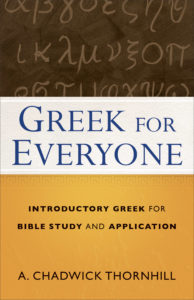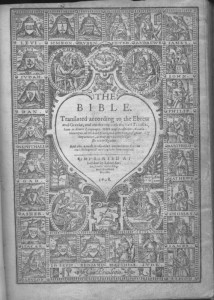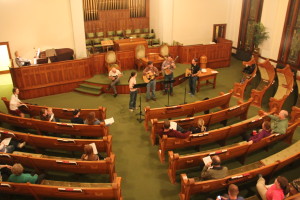 Greek for Everyone: Introductory Greek for Bible Study and Application, by A. Chadwick Thornhill
Greek for Everyone: Introductory Greek for Bible Study and Application, by A. Chadwick Thornhill
Greek for Everyone is an introduction to New Testament exegesis. It is primarily an introduction to the mechanics of Greek grammar and how to make use of tools to understand the Greek text. There are additionally a few chapters that deal with textual criticism, translation philosophy, interpreting within different contexts, etc….
The books aims at explaining enough of how Greek works to be able to understand and use exegetical tools, without having memorized vocabulary and patterns. So someone who finishes Greek for Everyone should be able to understand what “aorist subjunctive” means, but without memorizing the forms. They would be able to make fuller use of an interlinear, commentary, or other tools but not able read a Greek text.
I found the introductory chapters on the way language works and how to break down a sentence into smaller segments very helpful. Getting a big picture view and thinking of what connects phrases makes sense before getting into the details. Chapter 4, which surveys current resources, was also helpful. I appreciate that it lists several free, online resources rather than assuming the reader was using particular software.
The core material dealing with the details of grammar though I found to be dense. The chapters cover different parts of speech and the different ways they might function with an example from scripture, but the explanations are pretty terse and the would have benefited from more examples. Also, having several new terms introduced, I would have found glossary very helpful in working through these sections as well as for later reference.
I could see this being a helpful book for someone who wanted to dig a little deeper in their Bible study, to do word studies, or to understand better what is behind the English translations. I could also see it being a helpful overview for someone to use before taking a Greek class or working through an introductory grammar, or even someone who has studied in seminary but needs a refresher.
I would note that Thornhill uses John’s statement about Baptism in Luke 3:16 as an example of dative of location (“in water”) and parenthetically defines baptism as “immersing” (p. 58). He offers no argument for why this would be locative rather than showing the means (“with water”) as most translations have it and doesn’t here note the range of meanings of the word βαπτιζω. Acknowledging other translation possibilities as valid would have made it more like for me as a Presbyterian to recommend this to teachers within our congregation.
Overall I thought this was a worthwhile aid, but one that would need to be supplemented by other resources. So I’m glad the book closes with good recommendations for continued study.
Disclosure: I received this book free from Baker Books through the Baker Books Bloggers www.bakerbooks.com/bakerbooksbloggers program. The opinions I have expressed are my own, and I was not required to write a positive review. I am disclosing this in accordance with the Federal Trade Commission’s 16 CFR, Part 255 http://www.access.gpo.gov/nara/cfr/waisidx_03/16cfr255_03.html.







 Once [jurisprudence] departs from that the security that justice possesses only in God and his Word, practitioners of jurisprudence are able to deduce justice from no other source than tradition and society’s sense of justice. And since this sense of justice is as unstable as the waters of a flowing stream, it steadily undermines the security of the concept of justice. – Abraham Kuyper
Once [jurisprudence] departs from that the security that justice possesses only in God and his Word, practitioners of jurisprudence are able to deduce justice from no other source than tradition and society’s sense of justice. And since this sense of justice is as unstable as the waters of a flowing stream, it steadily undermines the security of the concept of justice. – Abraham Kuyper